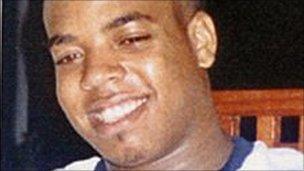Azelle Rodney lawyers 'can see' police surveillance film
- Published

The High Court has dismissed a bid to stop family lawyers of a man shot dead by officers in north-west London seeing covert surveillance footage.
Sir Christopher Holland - chairman of the public inquiry into Azelle Rodney's 2005 death - said the film should be shown to the legal teams.
The Metropolitan Police said it was not in the public interest to reveal it.
They argued Sir Christopher had acted "irrationally" but three High Court judges upheld his decision.
The footage was shot during a surveillance operation involving Mr Rodney, 25, who was shot six times at point-blank range.
Drug heist
Officers in a police helicopter filmed Mr Rodney and two other men in a car for several hours in the Harlesden and Edgware areas before the fatal shooting in Hale Lane.
The men were suspected of planning an armed drug heist.
Earlier this month Sir Christopher - a retired High Court judge - ruled the footage should be seen by family lawyers to allow them to make submissions about why the material should be part of the evidence.
The Metropolitan Police (Met) wanted to withhold it on the grounds it would not be in the public interest to reveal it and argued it should have immunity from disclosure.
At a hearing last week, Anne Studd QC, appearing for the Met, submitted Sir Christopher had reached a conclusion that was so irrational it should be quashed.
But on Monday, Lord Justice Pitchford, Mr Justice Foskett and Judge Peter Thornton QC dismissed the action.
The three judges ruled Sir Christopher had approached "as the rule required" the questions of whether disclosure to an individual "is necessary" and, if so, should disclosure to the person be permitted.
The special inquiry set up to establish how Mr Rodney died has heard it was like a "cowboy and western scene" when armed police stopped the car and an officer opened fire.
Officers feared the occupants were carrying machine guns so they could rob a Colombian drugs gang.
- Published20 September 2012
- Published5 September 2012
- Published4 September 2012
- Published4 September 2012
- Published3 September 2012